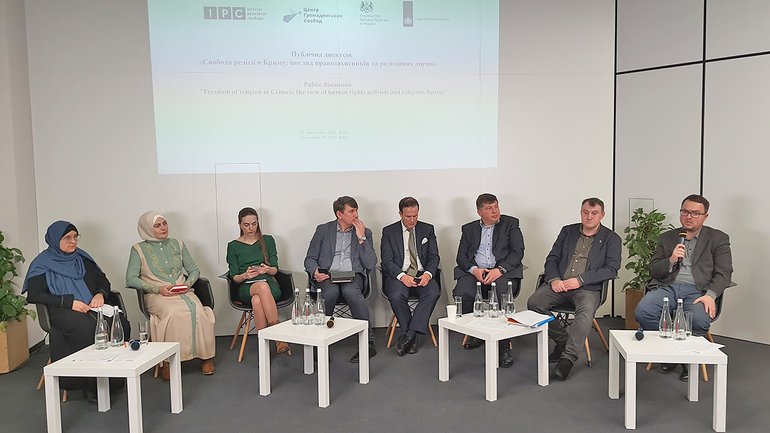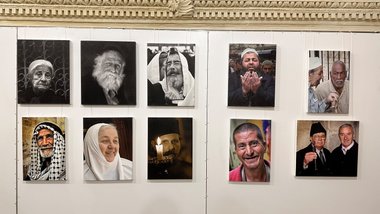Russian occupation of Crimea has caused infringement of freedom of conscience and religion, - expert opinion

According to the Institute for Religious Freedom, the panellists noted that since the beginning of the Russian military intervention on the Crimean Peninsula, Ukrainian churches and religious communities have become targets for targeted harassment of their activities.
Oleksandr Zayets, chairman of the board of the Institute for Religious Freedom, moderator of the round table on religious freedom, noted that the Russian authorities have established a requirement for mandatory re-registration of religious organizations and objects of religious significance in Crimea, coercion to transfer to Russian citizenship, control over the publication and distribution of religious literature, special rules for carrying out missionary activities.
He added that one of the methods of pressure was the deprivation of ownership of religious buildings of Ukrainian churches through physical seizures and decisions of the courts of the occupation authorities. Also today, the practice of mass raids in mosques in Crimea to check the documents of Muslims is widespread. The number of cases initiated for belonging to religious organizations recognized as terrorists or extremists in Russia is growing.
The participants of the discussion testified that the occupation authorities of Crimea continue to persecute religious figures and individual believers, in particular, Muslims from among the Crimean Tatars, the community of the Orthodox Church of Ukraine and Evangelical Christians.
Specific facts of oppression of religious freedom in Crimea were cited by the authorized representative of the Crimean Diocese of the Orthodox Church of Ukraine Andriy Shchekun, coordinator of the Crimean Childhood Initiative Mumine Salieva, Deputy Chairman of the All-Ukrainian Union of Evangelical Christian Baptist churches Igor Bandura, Press Secretary of the Religious Administration of Muslims of the Autonomous Republic of Crimea Batul Rustamova, as well as Lawyer of the Crimean solidarity initiative Lilya Gemedzhi, who joined the discussion via video broadcast.
Chairman of the board of the Center for Civil Liberties, co-coordinator of the round table on religious freedom Oleksandra Matviychuk noted:
"If you look from the point of view of international standards and Human Rights, the occupation authorities of Crimea and the Russian Federation as a whole do not recognize religious freedom in Crimea, but rather consider it as a collective category. If a particular religious organization is loyal to the Russian authorities or is under their special preferences, then believers of this community have the opportunity to exercise their right to religious freedom, and if not, they are persecuted."
Russian human rights activists also see the actions of the Crimean occupation authorities as purposeful harassment of freedom of thought, conscience and religion. Serhiy Davidis, a member of the Council of the Memorial human rights Center, spoke about the use of anti-terrorist and anti-extremist legislation of the Russian Federation in order to suppress religious freedom in Crimea.
In Russia, the anti-terrorist and anti-extremist legislation are applied quite arbitrarily, but in recent years it has been degraded: it has become increasingly strict and arbitrary. The severity of penalties on such charges and the arbitrary application of legislation are aggravated by the complete lack of independent legal proceedings in Russia.
Anton Korinevych, Permanent Representative of the president of Ukraine in the Autonomous Republic of Crimea, also shared his assessments of the state of human rights in Crimea, and religious freedom in particular.
The event was attended, including via video link, by representatives of many foreign embassies and missions.
Deputy Head of Mission, interim charge d'affaires of the United Kingdom to Ukraine Nicholas Garrox added: "The United Kingdom is firmly committed to promoting and protecting the rights to freedom of religion and religion around the world and is a powerful international voice in such protection. The Russian Federation's systemic violations of the rights of religious minorities in Crimea are unacceptable."
Human rights defenders and religious figures also discussed what practical measures can and should be taken within the framework of the Crimean platform to restore religious freedom in the occupied Ukrainian peninsula.

The discussion ended with the speakers ' answers to questions from the viewers of the video broadcast. The organizers of the event also said that the issue of religious persecution in Crimea by the Russian occupation authorities will be raised in a separate resolution, which will be prepared and published by the participants of the Round Table on religious freedom in Ukraine.
The event is organized jointly by the Institute of religious freedom, the Center for civil liberties, the British Embassy in Ukraine as part of the Round Table Initiative on Religious Freedom in Ukraine with the support of the Embassy of the Kingdom of the Netherlands in Ukraine as part of the IRS project "mobilizing the international community to end identity-based persecution in non-government-controlled regions of Ukraine".
Full video of the expert discussion:
For reference: Round Table Discussion on Religious Freedom in Ukraine (ReligiousFreedom.in.ua) is a permanent platform for dialogue between various representatives of civil society, primarily between religious and human rights organizations, with the involvement of experts and government representatives. The Round Table is coordinated jointly by the Center for civil liberties and the Institute for Religious Freedom.










